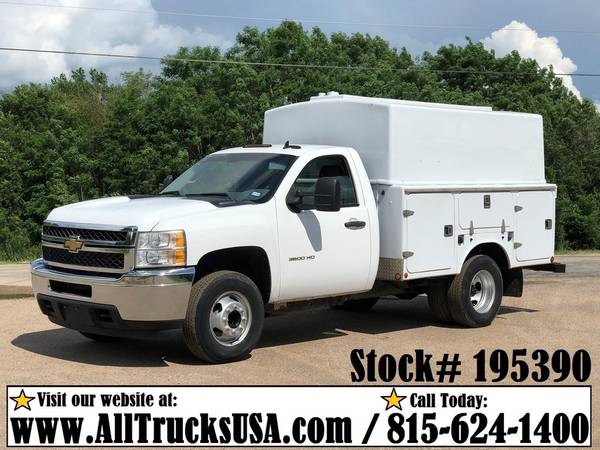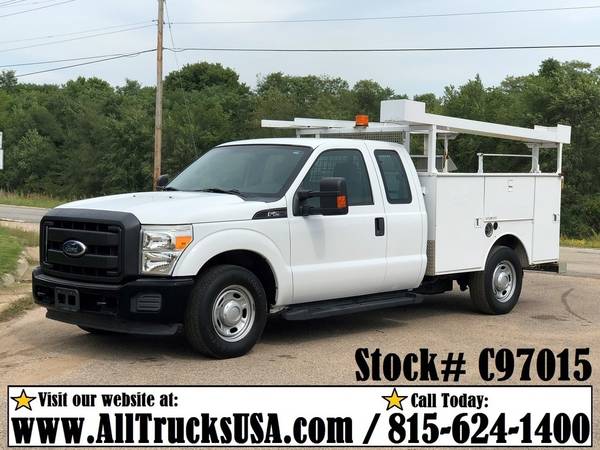Light Duty Work Trucks for Sale: Your Comprehensive Guide to Finding the Perfect Partner

Light Duty Work Trucks for Sale: Your Comprehensive Guide to Finding the Perfect Partner
In the bustling world of small businesses, independent contractors, and even savvy homeowners, the right vehicle can be the difference between merely getting by and truly thriving. Among the vast array of commercial vehicles, light duty work trucks for sale stand out as indispensable assets, offering a compelling blend of versatility, efficiency, and capability. These vehicles are the unsung heroes of countless trades, from plumbing and electrical work to landscaping, construction, and delivery services, providing the muscle and adaptability needed to tackle daily challenges.
This comprehensive guide aims to illuminate every facet of finding, evaluating, and purchasing light duty work trucks. Whether you’re a seasoned professional looking to expand your fleet, a budding entrepreneur starting a new venture, or a homeowner needing a reliable utility vehicle, understanding the nuances of these trucks is paramount to making an informed decision that will serve you well for years to come.
The Backbone of Small Business and Personal Utility: Defining Light Duty Work Trucks
At its core, a light duty work truck is typically defined by its Gross Vehicle Weight Rating (GVWR), falling into Class 1 (0-6,000 lbs GVWR) or Class 2 (6,001-10,000 lbs GVWR). This classification primarily includes half-ton pickup trucks (like the Ford F-150, Chevrolet Silverado 1500, Ram 1500), mid-size pickups (Toyota Tacoma, Ford Ranger), and a range of cargo vans (Ford Transit Connect, Ram ProMaster City). Unlike their heavy-duty counterparts, light duty trucks are designed for more modest hauling and towing needs, often prioritizing fuel efficiency, maneuverability, and a lower cost of ownership.
Their importance stems from their incredible adaptability. They can navigate urban streets with relative ease, fit into standard parking spaces, and yet possess ample capacity to transport tools, materials, and equipment. For small businesses, they represent a significant step up in professionalism and capability from a personal car, often at a more accessible price point than larger commercial vehicles. For personal utility, they offer the freedom to pursue hobbies, home improvement projects, or weekend adventures without relying on rental services or straining personal vehicles.
What Defines a Light Duty Work Truck?
Understanding the specific characteristics of light duty trucks is crucial for discerning which vehicle best suits your operational demands.
- GVWR Classification: As mentioned, they fall into Class 1 or 2, indicating their maximum permissible operating weight, including the vehicle itself, its passengers, cargo, and any towed load’s tongue weight. This is the primary differentiator from medium and heavy-duty trucks.
- Common Characteristics:
- Payload Capacity: Ranging from 1,000 lbs to over 2,000 lbs for half-ton trucks, and often less for mid-size or compact vans. This dictates how much weight you can safely carry in the bed or cargo area.
- Towing Capacity: Light duty trucks can typically tow anywhere from 5,000 lbs to 13,000 lbs, depending on the engine, axle ratio, and specific configuration. This is vital if you plan to pull trailers for equipment, boats, or campers.
- Engine Options: Most light duty trucks offer a variety of gasoline engines, from efficient V6s and turbocharged 4-cylinders to powerful V8s. Some models might offer small displacement diesel engines, though these are more common in heavy-duty segments.
- Bed Sizes & Cabin Configurations: Pickups come in various bed lengths (5.5 ft, 6.5 ft, 8 ft) and cab styles (Regular Cab for maximum bed length, Extended Cab for occasional passengers, Crew Cab for maximum passenger space). Cargo vans offer diverse interior volumes and door configurations.
The distinction from heavy-duty trucks (Class 3 and above) lies not just in GVWR but also in frame strength, axle ratings, brake systems, and overall component robustness designed for continuous, severe-duty work. While a light duty truck can handle significant tasks, it’s not built for the constant, heavy loads that a 3/4-ton or 1-ton truck is designed to manage.
Key Benefits of Opting for a Light Duty Work Truck
Choosing a light duty work truck offers a multitude of advantages that resonate with practical-minded buyers:
- Enhanced Fuel Efficiency: Compared to their heavier counterparts, light duty trucks generally offer better fuel economy, which translates to lower operating costs over time, a significant factor for businesses.
- Superior Maneuverability: Their smaller footprint and tighter turning radius make them easier to navigate through congested city streets, construction sites, and tight parking lots, saving time and reducing driver stress.
- Lower Initial Cost & Maintenance: Both the upfront purchase price and ongoing maintenance costs are typically less for light duty trucks, making them a more accessible investment for small businesses and individuals.
- Unrivaled Versatility: A light duty truck can seamlessly transition from a workhorse during the week to a family vehicle or adventure-mobile on the weekends. They excel at hauling lumber, tools, equipment, or towing trailers, yet remain comfortable enough for daily commuting.
- Customization Potential: The aftermarket industry for light duty trucks is vast. Owners can easily add toolboxes, ladder racks, bed liners, utility caps, service bodies, and other accessories to perfectly tailor the vehicle to their specific trade or hobby.
- Wider Range of Models and Trims: The popularity of light duty trucks means there’s an extensive selection of models, trim levels, and configurations available, allowing buyers to find a vehicle that precisely matches their needs and budget.
Types and Categories of Light Duty Work Trucks for Sale
The market for light duty work trucks is diverse, offering options for almost any requirement:
- Full-Size Half-Ton Pickups: These are the most popular choice for general work, offering a balance of towing, payload, and comfort. Examples include the Ford F-150, Chevrolet Silverado 1500, Ram 1500, Toyota Tundra, and Nissan Titan. They come in various cab and bed configurations.
- Mid-Size Pickups: For those who need truck capabilities but in a more compact, fuel-efficient package, mid-size pickups are ideal. The Toyota Tacoma, Ford Ranger, Chevrolet Colorado, Honda Ridgeline, Nissan Frontier, and Jeep Gladiator offer good utility without the bulk of a full-size.
- Cargo Vans: When security, weather protection, and an enclosed workspace are priorities, light duty cargo vans like the Ford Transit Connect, Ram ProMaster City, and Nissan NV200 are excellent choices. They offer configurable interiors for shelving and tools and often boast car-like driving dynamics.
- Specialized Light Duty: While less common for the general buyer, some light duty chassis are upfitted with specific bodies like small flatbeds, dump beds, or dedicated utility/service bodies. These are often seen in municipal fleets or specialized trades.
Important Considerations When Buying a Light Duty Work Truck
Purchasing a work truck is a significant investment. Thoughtful consideration of these factors will guide you toward the best choice:
- Your Specific Needs: Clearly define what you’ll be using the truck for. Will it be primarily for hauling light tools, heavy materials, or towing a trailer? How many passengers will you typically carry?
- Payload and Towing Capacity: Do not guess. Check the specific truck’s capacities (found on a sticker inside the door jamb or owner’s manual) and ensure they exceed your maximum anticipated loads. Overloading is dangerous and can void warranties or lead to costly repairs.
- Engine and Drivetrain: A powerful V8 might be great for towing, but a V6 or turbocharged 4-cylinder could offer better fuel economy for daily driving with lighter loads. Consider 2WD for efficiency on paved roads or 4WD for off-road access, snow, or challenging job sites.
- Cab Configuration: Choose between a Regular Cab (most affordable, longest bed on a given wheelbase), Extended Cab (small rear seats, good for occasional passengers/storage), or Crew Cab (four full doors, spacious rear seats for a crew).
- Bed Length: Match the bed length to the materials you typically carry. A short bed (5.5 ft) is easier to maneuver, while an 8 ft bed is essential for full sheets of plywood or long pipes.
- New vs. Used: A new truck offers the latest features, full warranty, and no prior wear. A used truck can offer significant savings, but requires more careful inspection and research into its history.
- Trim Level and Features: Do you need a basic "work truck" trim with vinyl seats and minimal tech, or do you require comfort features, advanced infotainment, or specific towing packages? Balance needs with budget.
- Aftermarket Upgrades: Plan for any essential additions like toolboxes, ladder racks, or utility caps. Some upgrades are easier or cheaper to install at the time of purchase.
- Budget and Financing: Beyond the purchase price, factor in insurance, registration, fuel, maintenance, and potential depreciation. Explore financing options carefully.
- Resale Value: Certain makes and models, particularly Toyota and Ford, are known for strong resale values, which can be an important long-term financial consideration.
Where to Find Light Duty Work Trucks for Sale
The market offers several avenues to explore:
- Dealerships (New & Used): Manufacturer dealerships offer new models with warranties and often certified pre-owned (CPO) options. Independent used car lots have a wider variety of makes and models.
- Online Marketplaces: Websites like AutoTrader, Cars.com, Kelley Blue Book, and Edmunds allow you to search vast inventories, compare prices, and filter by specific features.
- Auction Houses: Public and private auto auctions can offer competitive prices, but often require more expertise in vehicle inspection and understanding auction rules.
- Private Sellers: Local classifieds, online forums, and Facebook Marketplace can yield good deals, but require extra vigilance in verifying vehicle condition and title.
Tips for a Smart Purchase
Once you’ve narrowed down your choices, these tips will help ensure a smooth transaction:
- Define Your Budget and Stick to It: Account for the total cost of ownership, not just the purchase price.
- Research Thoroughly: Read professional reviews, compare specifications, and watch owner experience videos for your top choices.
- Inspect the Vehicle Meticulously (especially used): Look for rust (especially on the frame and suspension components), signs of accidents (uneven panel gaps, mismatched paint), fluid leaks, and tire wear.
- Test Drive Extensively: Drive on highways, city streets, and replicate your typical driving conditions. Pay attention to engine performance, transmission shifts, braking, and steering. If buying a used truck, drive it for at least 20-30 minutes to let the engine warm up and reveal any issues.
- Check Vehicle History Report (Used): Invest in a CarFax or AutoCheck report to uncover accident history, service records, odometer discrepancies, and title issues.
- Negotiate Confidently: Don’t be afraid to negotiate the price, especially on used vehicles. Research fair market values beforehand.
- Consider a Pre-Purchase Inspection (Used): For any used truck, it’s highly recommended to have an independent mechanic perform a pre-purchase inspection. This small investment can save you from significant repair costs down the line.
- Understand Warranty: Be clear about what warranties (manufacturer, CPO, or third-party) are included or available, especially for used trucks.
Potential Challenges and Solutions
Even with careful planning, challenges can arise. Being prepared is key:
- Overloading: Exceeding payload or towing limits can damage the truck, compromise safety, and lead to fines.
- Solution: Always know your truck’s capacities and use a scale if unsure about cargo weight. Distribute weight properly.
- Underpowering: Choosing an engine too small for your typical loads can lead to poor performance and excessive wear.
- Solution: Honestly assess your power needs. If frequent heavy hauling or towing is involved, opt for a more robust engine option.
- Fuel Costs: While more efficient than heavy-duty, fuel costs can still be substantial.
- Solution: Drive efficiently, consider a smaller engine, or explore hybrid/electric options if available in your desired segment. Plan routes to minimize mileage.
- Maintenance Neglect: Skipping regular maintenance can lead to costly breakdowns.
- Solution: Adhere strictly to the manufacturer’s recommended service schedule. A well-maintained truck lasts longer and holds its value.
- Rust and Wear: Especially in regions with harsh winters or coastal environments, rust can be a major issue.
- Solution: Regular washing, undercarriage rinsing, and considering rustproofing treatments can extend the life of the vehicle.
- Finding the "Right" Truck: The sheer number of options can be overwhelming.
- Solution: Create a detailed checklist of your absolute must-haves, nice-to-haves, and deal-breakers before you start looking.
Price Table: Estimated Costs for Light Duty Work Trucks for Sale
Prices for light duty work trucks vary significantly based on make, model, year, mileage, condition, trim level, features, and regional market demand. The table below provides general estimated ranges as of late 2023/early 2024.
| Category | Vehicle Type | Condition | Estimated Price Range (USD) | Key Factors Influencing Price |
|---|---|---|---|---|
| New Trucks | Basic Work Trim (e.g., F-150 XL, Silverado 1500 WT, Ram 1500 Tradesman) | New | $35,000 – $45,000 | Cab type, bed length, 2WD/4WD, engine, optional packages |
| Mid-Size Pickup (e.g., Tacoma SR, Ranger XL, Colorado WT) | New | $30,000 – $40,000 | Engine, transmission, 2WD/4WD, specific work packages | |
| Compact Cargo Van (e.g., Transit Connect XL, ProMaster City Tradesman) | New | $28,000 – $38,000 | Engine, wheelbase, roof height, upfitting options | |
| Mid-Range Trim (e.g., F-150 XLT, Silverado 1500 LT, Ram 1500 Big Horn) | New | $45,000 – $60,000 | Added features, infotainment, alloy wheels, advanced safety | |
| High-End Trim (e.g., F-150 Lariat/King Ranch, Ram 1500 Limited, Silverado 1500 High Country) | New | $60,000 – $85,000+ | Luxury features, premium interiors, advanced tech, specialized engines | |
| Used Trucks | Full-Size Half-Ton Pickup (3-5 years old, good condition, 60k-100k miles) | Used | $20,000 – $40,000 | Mileage, condition, accident history, trim level, engine |
| Mid-Size Pickup (3-5 years old, good condition, 60k-100k miles) | Used | $18,000 – $30,000 | Mileage, condition, accident history, trim level, 4WD/2WD | |
| Compact Cargo Van (3-5 years old, good condition, 60k-100k miles) | Used | $15,000 – $28,000 | Mileage, condition, prior commercial use, upfitting included | |
| Older/Higher Mileage | Full-Size Half-Ton Pickup (5-10+ years old, 100k-200k+ miles) | Used | $10,000 – $20,000 | Extensive variability based on maintenance, rust, and overall wear |
Note: These are general estimates. Prices can fluctuate significantly based on local market conditions, specific features, and the individual vehicle’s history and condition.
Frequently Asked Questions (FAQ)
Q: What’s the main difference between a light-duty and heavy-duty truck?
A: The primary difference is the Gross Vehicle Weight Rating (GVWR). Light-duty trucks (Class 1-2, up to 10,000 lbs GVWR) are designed for general utility and moderate hauling/towing. Heavy-duty trucks (Class 3-8, 10,001+ lbs GVWR) have stronger frames, axles, brakes, and often diesel engines, built for continuous heavy loads and severe commercial applications.
Q: Can a light-duty truck tow a travel trailer?
A: Absolutely! Many light-duty half-ton trucks are capable of towing large travel trailers, with capacities often ranging from 7,000 to over 12,000 pounds. Always check the specific truck’s towing capacity and ensure your trailer’s loaded weight is within that limit.
Q: Are diesel engines available in light-duty trucks?
A: While less common than gasoline engines, some light-duty trucks do offer small displacement diesel engines (e.g., Ram 1500 EcoDiesel, Chevy Silverado/GMC Sierra 1500 Duramax). These often provide excellent torque for towing and better fuel economy, but typically come with a higher upfront cost and potentially more complex maintenance.
Q: What is GVWR and why is it important?
A: GVWR stands for Gross Vehicle Weight Rating. It’s the maximum safe operating weight of the vehicle as determined by the manufacturer, including the weight of the truck itself, its passengers, cargo, and any tongue weight from a trailer. Exceeding the GVWR can compromise safety, damage the vehicle, and is illegal.
Q: How important is 4WD for a work truck?
A: It depends on your work environment. If you frequently drive on unpaved roads, muddy job sites, steep inclines, or in snowy/icy conditions, 4WD is highly recommended for improved traction and capability. For primarily paved road use, 2WD is more fuel-efficient and less expensive.
Q: Should I buy a new or used light-duty work truck?
A: This depends on your budget and priorities. New trucks offer the latest technology, full warranties, and no prior wear, but come with a higher price and immediate depreciation. Used trucks are more affordable and have already depreciated, but require more thorough inspection and research into their history. Certified Pre-Owned (CPO) vehicles offer a middle ground with manufacturer-backed warranties.
Conclusion: Driving Your Business Forward
The search for light duty work trucks for sale is more than just finding a vehicle; it’s about identifying a reliable partner that will support your daily operations, enhance your efficiency, and contribute directly to your success. These versatile machines are a cornerstone for countless trades and personal endeavors, offering an ideal balance of capability, cost-effectiveness, and practicality.
By understanding their classifications, benefits, and the critical considerations involved in purchasing one, you empower yourself to make a decision that is not only financially sound but also perfectly aligned with your operational demands. Whether new or used, a well-chosen light duty work truck is an investment in productivity, reliability, and the freedom to tackle any task that comes your way. Drive smart, work hard, and let your light duty truck be the engine of your success.

